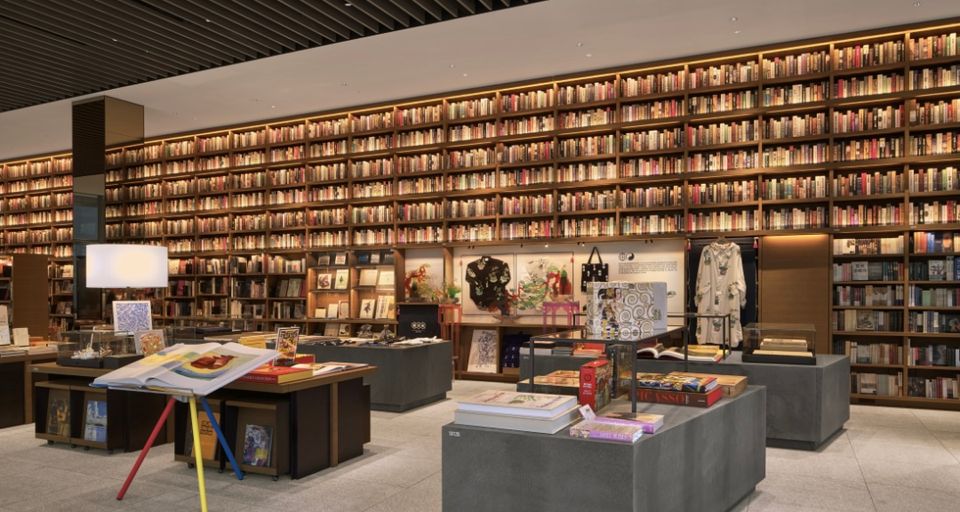Saving the bookstore

This past Monday, I walked by a physical bookstore in a mall and spontaneously went in to have a look. The books were all in Chinese, so I didn’t browse through any specific titles. However, I still stayed awhile and wandered throughout the well-decorated store.
On my way out, I was saddened to note that there was no line at the checkout counter. There were many people in the store and in the cafe inside. Many were reading, and some were studying. But no one was purchasing any books.
Perhaps everyone is buying books online these days. After all, the retail apocalypse hit bookstores the earliest; Amazon’s first aim (and tag line) was to be “the world’s largest bookstore”. It didn’t bode well for physical bookstores everywhere, and national bookstore chains such as Borders and Crown Books in the US declared bankruptcy in the years that followed.
Technology sweeps away the old as it moves ever forward. Nearly 700 years ago, Johannes Gutenberg created the printing press, irrevocably changing the world. At a time when books used to be solely the property of the clergy, each page painstakingly transcribed and copied, Gutenberg’s invention made books simple to produce and affordable, putting them in the hands of millions and sharply increasing literacy rates within a few decades.
Physical books have been an ever-present fixture in society ever since. But as the Internet and platforms such as iBooks and Amazon disseminate the printed book’s spiritual successors to iPads and Kindles everywhere, is it finally time to lay this centuries-old invention to rest?
The same question, I suppose, could be asked of other concepts marked for obsolescence - letters by post, movies in theatres, and face-to-face conversations (admittedly in increasing order of potential resistance from the population). Like physical books, each of these methods for communicating content has been replaced by new technologies to a significant degree.
Their decline is evident and inevitable. Then perhaps a better question is: Are they worth saving? Should digital experiences stop short of replacing their counterparts in real life? I think so.
Perhaps kids these days might not feel a visceral reaction when entering a bookstore, but I do. The smell of paper books brings back memories of childhood and a more carefree period of exploration. It might be quixotic, but I want kids these days to experience that same feeling - to fall in love with reading through the serendipity that arises from exploring shelves upon shelves of books, while flipping real, physical pages.
If I told people I wanted to open a bookstore, I’m almost certain that everyone would tell me that it’s a Very Bad Idea. I get it. I agree.
That said, would I still open a bookstore if money and return on investment were not necessary considerations? I think I would. In fact, I think it would make a great project.
So please humour me for a moment, and let’s consider - if I were to build the perfect bookstore, what would it look like?

Concept
Bookstores are most valuable to children and to the retired. In an ideal world, it's a place where I can spend an entire day with my daughter when she's older. I could read stories to her, or safely let her run free and explore her own interests while I browse books of my own in the bookstore's cafe.
Business model
The sale of books should not be the main revenue driver because purchasing physical books for a home library is an activity nearing extinction. Rather, I believe the focus should be on the following:
- An environment that inspires children to read and explore. This is valuable and not easily replicated by digital platforms.
- A pricing strategy that charges for time spent in the store, while making a copy of each book freely available for browsing. As a matter of personal principle, I don't buy books anymore, but I would absolutely pay a fee to settle down comfortably in a nice bookstore to read for a few hours.
- Books as gifts. People mostly buy books nowadays to gift them to someone else. Value could be added through prestige gift wrapping and knowledgeable customer service with advice on which books might be appropriate.
I may be dreaming, but in my mind, I see my ideal bookstore as a complex cultural space that engages every visitor. A centralized cafe where adults can read or work while keeping an unobtrusive eye on their children, where tables are engraved with game boards for chess and weiqi. A "Harry Potter" inspired room with long tables and bankers lamps, where students can engage in quiet study. A "fairy tale" area for younger children and story time, and a "tomorrowland" room for older children interested in science fiction, space, and technology. An "otaku" area for all ages with endless manga, graphic novels, and board games. Child-friendly bathrooms and furniture. The most comfortable sofas and soft carpet for leisurely reading.
A place like this doesn't exist, and will probably never exist. But wouldn't it be amazing if it did?




